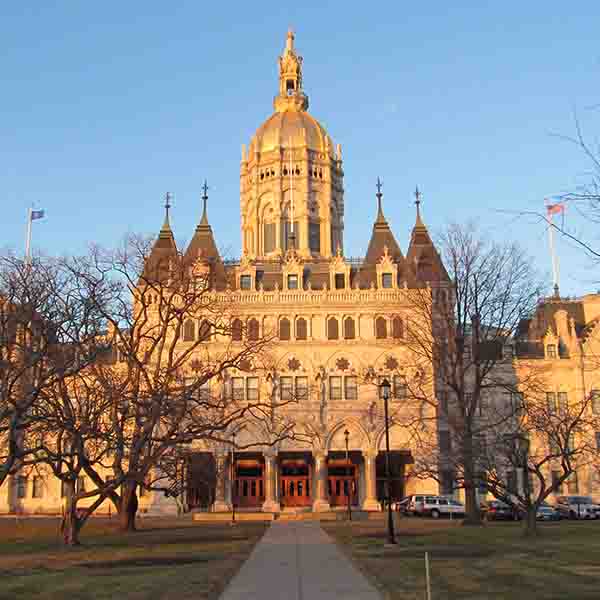
Wikimedia Commons
Provisions in a new budget approved by the Connecticut General Assembly would eliminate the Citizens’ Election Program, a voluntary program that provides public financing to state candidates.
The two-year budget, proposed by Senate Republicans and passed by both chambers of the legislature, would cut the 12-year-old program in an effort to reduce Connecticut’s two-year, $3.5 billion budget deficit. Proponents of the program argue that it holds state politicians accountable by mandating disclosures and levels the playing field among candidates by limiting expenditures. Gov. Dannel Malloy has already vowed to veto the GOP budget, calling it “unbalanced.”
The move to cut the program drew a quick rebuke from the State Elections Enforcement Commission, the organization that oversees the program and works to ensure election integrity within the state.
“The elimination of the [Citizens’ Election Program] is a systemic rewriting of the way that Connecticut’s government functions for its citizens,” the commission said in a Sept. 22 letter to Malloy in response to the proposed elimination of the program.
The program was signed into law by former Republican Gov. Jodi Rell in 2005 after her predecessor, Gov. John Rowland, was sent to jail for engaging in corrupt practices, such as allowing state contractors to make free repairs to his home. The program provides grants to candidates for statewide offices, including the General Assembly. In order to qualify for the program, candidates must raise at least $5,000 as a House candidate or $15,000 as a Senate candidate in order to indicate the viability of their candidacy. Those funds must come from individual contributions, each capped at $100.
Additionally, candidates must agree to abide by guidelines such as contribution and expenditure limits, as well as disclosure requirements. Over the past two election cycles, 77 percent of candidates for the state legislature have participated in the program.
“I’ve always been an advocate of the [Citizens’ Election Program],” said state Sen. Gary Holder-Winfield, D-New Haven. “I believe the system allows for people to enter politics that otherwise wouldn’t be able to enter politics.”
He added that this could help explain why some incumbent candidates hope to scrap the program.
Winfield also noted that the rules for raising qualifying funds require candidates to reach out to their own constituents rather than focusing on gaining support from special-interest groups or wealthy donors.
“It makes the person who has five or ten dollars more important,” he said. “If you’re selling your soul for $100, you have bigger problems than the fact that you’re corrupt.”
Republicans argue that keeping the Citizens’ Election Program, which is funded primarily by the sale of abandoned property and voluntary donations, is too costly at a time when Connecticut is in dire financial straits. Senate Republican President Pro Tempore Len Fasano ’81, R-North Haven, said in a May statement that the Citizens’ Election Program was a “mere shadow of the original bill” due to loopholes created by Democrats.
Fasano said he voted for the program originally and would not have suggested cutting the program had Democrats been receptive to Republican-initiated reforms, such as eliminating grants to unopposed candidates and capping expenditures by state parties.
Various public-interest organizations have expressed concern about the proposed cuts to the program. Carol Reimers, president of the League of Women Voters of Connecticut, said she worried that the end of the program would lead to more corrupt elections.
“We really were quite astonished to hear that it was being completely eliminated in this latest budget,” she said. “We just found that really difficult to understand why a successful program, one that keeps elections away from dark money, would be considered a viable option to [cut].”
Reimers also noted that the program allows candidates to spend more time on constituents’ issues rather than fundraising and courting donors for future campaigns.
Cheri Quickmire, executive director of the nonpartisan watchdog group Common Cause in Connecticut, said that the argument that the program is too expensive is misleading.
“It’s a microscopic slice of the state budget. It does not come out of taxpayer money,” she said. “We’re looking for fair elections and a budget that protects our elections.”
Advocates for the program were also put off by the manner in which the budget passed. According to Winfield, the approximately 900-page budget document was only entered into the computer system 30 minutes after debate began on the Senate floor.
According to activists, the Senate is not the only legislative body to have employed an underhanded move to pass the budget.
Tom Swan, the executive director of the Connecticut Citizen Action Group, noted that, when the House passed the bill, they did not vote on it until after midnight.
“It’s a partisan ploy by Republicans to create a new system that they believe is advantageous to them,” he said of the elimination of the program.
The legislation passed when three Democrats in the Senate and five in the House crossed party lines to vote in the affirmative.
The budget is now nearly three months overdue, making this the longest fiscal stalemate in state history. Connecticut is the only state without a budget for fiscal year 2018.
Talia Soglin | talia.soglin@yale.edu







